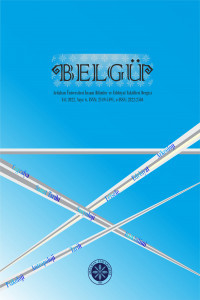Anneliğin İtibar Kaybının Temelleri: Apollon ve Babalığın Yüceltilmesi
Bu çalışmada antik Yunan toplumunda kadınların annelikleri üzerinden sahip oldukları bazı hakları, hukuki ve sosyal olarak kaybetmeleri ile babalığın yüceltilmesi arasında bir sebep-sonuç ilişkisi olup olmadığı sorusu, Aiskhülos’un Oresteia tragedyası üzerinden, Apollon’un bu oyunda Orestes’i korumak ve savunmak için öne sürdüğü savlar dikkate alınarak araştırılacak ve Yunan mitolojisinde Apollon’un babalığın yüceltilmesinde ve bu yüceltmenin inşasında oynadığı rol incelenecektir. Aiskhülos’un Oresteia üçlemesi, babalığın üstünlüğünün nasıl tesis edildiğini gösteren önemli metinler arasındadır. Bu tragedya üçlemesinde analık ile babalık arasındaki mücadele tanrısal düzeydeki müdahalelerle ele alınmıştır. Güneş tanrısı Apollon, söz konusu oyunlarda babalık hakkının şiddetli bir koruyucusu olarak kendisini gösterir. Bu koruyuculuk devrim niteliğindedir çünkü bir önceki devrin kan hakkını da ortadan kaldırmayı hedefler. Oresteia’da Apollon, babalığın üstünlüğünü vurgulayan söylemlerinin yanı sıra anneliği de yeren savları ile dikkat çeker. Orestes’i annesinden babasının intikamını alması için kışkırtır, daha sonra Orestes’in peşine düşen Erinysler’in intikam almasını engellemek için uğraşır. Nihayetinde Athena’nın da müdahalesi ile Orestes’in kışkırtıcısı, koruyucusu ve savunucusu Apollon isteğine ulaşacak ve oluşturulan mahkeme babalık hakkının üstünlüğünü kabul eden bir karar alacaktır. Apollon anneliği yeren ve babalığı yücelten sözleri ile babalığın annelikten üstünlüğünü anlatırken bir yandan da erkekliğin de kadınlıktan üstün olduğunu ifade eder. Apollon’un bu tutumu Apollon’u ve onun takipçisi erkekleri, hiçbir ilişkileri kalmayacak şekilde kadınlardan uzaklaştırır. Kadınlardan ve onların sembolize ettiği tüm değerlerden uzaklaşan Apollon’un üstün olduğunu öne sürdüğü babalık, oyunda ona yardım eden Athena örneğinde olduğu gibi annesiz ve ruhanidir. Bu aşamadan sonra iyi, güçlü, kuvvetli olan her kavram ve oluşun erkek ile, bunların karşısında ve aşağısında olduğu düşünülen her kavramın da kadın ile özdeşleştirildiği görülür.
Anahtar Kelimeler:
Eumenides, Apollon, Athena, Erinysler, Orestes, Aiskhülos, Keywords: Aeschylus, Erinys, Aeschylus
The Foundation of Discrediting Motherhood: Apollon and Glorification of Fatherhood
In this study, the question of whether there is a cause-effect relationship between women's legal and social loss of status and the glorification of fatherhood in ancient Greek society, through the tragedy of Oresteia by Aeschylus, and Apollon's attempt to protect and defend Orestes in this play will be examined. By taking into account the arguments Apollon put forward and the role played by Apollon in the glorification of fatherhood in Greek mythology and the construction of this glorification will be examined. Aeschylus' Oresteia trilogy can be counted among the important texts showing how the superiority of paternity is established. In this tragedy trilogy, the struggle between motherhood and fatherhood is handled with divine interventions. The sun god Apollon shows himself as a fierce protector of paternal rights. This protection is revolutionary because it aims to abolish the right to the blood of the previous era. In Oresteia, Apollon draws attention to his arguments that criticize motherhood as well as his discourses emphasizing the superiority of fatherhood. He provokes Orestes to avenge his father, then tries to prevent the Erinyss, who are after Orestes, from taking revenge. Eventually, with the intervention of Athena, Apollon, the instigator, protector, and defender of Orestes, will reach his will and the court will take a decision accepting the supremacy of the paternity right. While describing the superiority of fatherhood over motherhood, Apollon also expresses that masculinity is superior to femininity with his words that criticize and glorify paternity. This attitude of Apollo drives Apollo and his followers away from women so that they have no relationship. Away from women and all the values they symbolize, the fatherhood that Apollon claims to be superior is motherless and spiritual, as in the example of Athena who helps him in the game. After this stage, it is seen that every concept and being that is good, strong, and strong is identified with a man, and every concept that is thought to be opposite or inferior to them is identified with a woman.
___
- Aeschylus (Aiskhülos). (1979). The Oresteia: Agamemnon, The Libation Bearers, Eumenides. (Robert Fagles, Çev.). W. B. Stanford (Ed.). Penguin Books.
- Chappell, M. (2006). Delphi and the Homeric Hymn to Apollo. The Classical Quarterly, 56(2), 331–348.
- Cromey, R. D. (2006). Apollo Patroos and the Phratries. L’Antiquité Classique, 75, 41–69.
- Davies, M. (1990). Aeschylus’ Titans. Hermes, 118(1), 125–127.
- Fagles, R. ve Stanford, W. B. (1979). A Reading of ‘The Oresteia’: The Serpent and The Eagle. Aeschylus. The Oresteia içinde. Penguin Books.
- Frye N. ve Macpherson, J. (1962, 2004). Biblical and Classical Myths: The Mythological Framework of Western Culture. University of Toronto Press.
- Griffith, M. (1999). The King and Eye: The Rule of the Father in Greek Tragedy. Proceedings of the Cambridge Philological Society, 44, 20-84.
- Harrison, J. E. (1955). Prolegomena to the Study of Greek Religion. Meridian Books.
- Hesiod (1914). The Homeric Hymns and Homerica with an English Translation. (H. G Evelyn-White, Çev. ve Haz.). Harvard University Press.
- Lloyd-Jones, H. (1976). The Delphic Oracle. Greece & Rome, 23(1), 60–73.
- Miller, D. A. (1977). A Note on Aegisthud as “Hero”. Arethusa, 10(2), 259-268.
- Murray, G. (1914). Hamlet and Orestes: A Study in Traditional Types, Oxford University Press.
- Rose, H. J. (1926). Prehistoric Greek and Mother-Right. Folklore, 37(3), 213-244.
- Schroeder, Jeanne L. (2000). The Eumenides: The Foundation of Law in the Repression of the Feminine. SSRN: https://papers.ssrn.com/sol3/papers.cfm?abstract_id=214829
- Stent, G. S. (1998). Epistemic Dualism of Mind and Body. Proceedings of the American Philosophical Society, 142(4), 578–588.
- Zeitlin, F. I. (1978). The Dynamics Of Misogyny: Myth And Mythmaking In The Oresteia. Arethusa, 11(1/2), 149–184.
- ISSN: 2149-5491
- Yayın Aralığı: Yılda 2 Sayı
- Başlangıç: 2015
- Yayıncı: Ardahan Üniversitesi
Sayıdaki Diğer Makaleler
William Blake’in Cennet ile Cehennemin Evliliği Eseri ve Coincidentia Oppositorum
Anneliğin İtibar Kaybının Temelleri: Apollon ve Babalığın Yüceltilmesi
İrtiş Nehri İsmi ve Ortaya Çıkışıyla İlgili Efsaneler
Maaday- Kara Destanında Kahramanın Mitik Yolculuğu
Yaşayan Ateş Kültü: Sanat ve Mitlerde Ateşin Sembolizmi
Mitoloji ve Ortak Bilinç: Homeros ve Vergilius’un Aeneas’ı
Deniz AKDENİZ, Nurşah ÇOKBANKİR ŞENGÜL
Kırgızlarda Dağ Keçilerinin Koruyucu İyesi “Kayberen”
Jungçu Arketipler Bağlamında Astro-mitik İkilikler
Sürgün Şair Nûri El-Cerrâh’ın Şiirlerinde Bir Sığınak Olarak Mitolojik Öğeler
